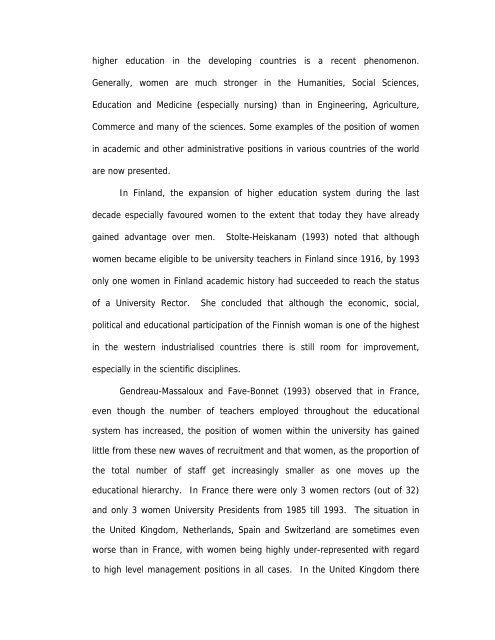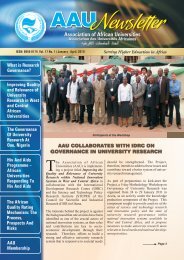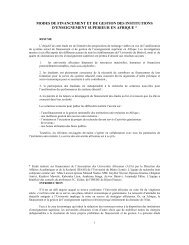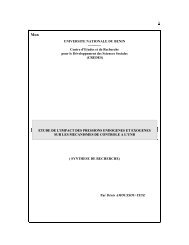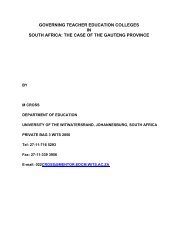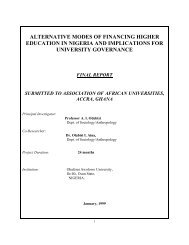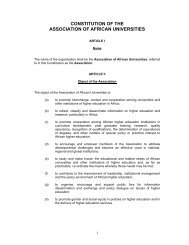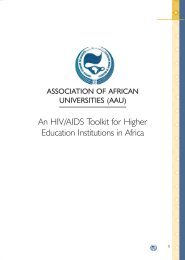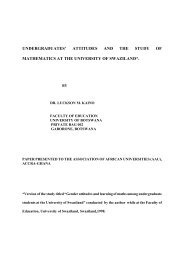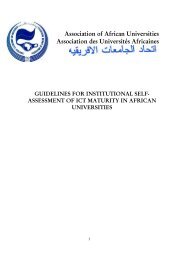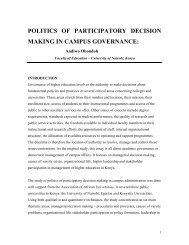women in academic positions in the universities in nigeria
women in academic positions in the universities in nigeria
women in academic positions in the universities in nigeria
Create successful ePaper yourself
Turn your PDF publications into a flip-book with our unique Google optimized e-Paper software.
higher education <strong>in</strong> <strong>the</strong> develop<strong>in</strong>g countries is a recent phenomenon.Generally, <strong>women</strong> are much stronger <strong>in</strong> <strong>the</strong> Humanities, Social Sciences,Education and Medic<strong>in</strong>e (especially nurs<strong>in</strong>g) than <strong>in</strong> Eng<strong>in</strong>eer<strong>in</strong>g, Agriculture,Commerce and many of <strong>the</strong> sciences. Some examples of <strong>the</strong> position of <strong>women</strong><strong>in</strong> <strong>academic</strong> and o<strong>the</strong>r adm<strong>in</strong>istrative <strong>positions</strong> <strong>in</strong> various countries of <strong>the</strong> worldare now presented.In F<strong>in</strong>land, <strong>the</strong> expansion of higher education system dur<strong>in</strong>g <strong>the</strong> lastdecade especially favoured <strong>women</strong> to <strong>the</strong> extent that today <strong>the</strong>y have alreadyga<strong>in</strong>ed advantage over men. Stolte-Heiskanam (1993) noted that although<strong>women</strong> became eligible to be university teachers <strong>in</strong> F<strong>in</strong>land s<strong>in</strong>ce 1916, by 1993only one <strong>women</strong> <strong>in</strong> F<strong>in</strong>land <strong>academic</strong> history had succeeded to reach <strong>the</strong> statusof a University Rector. She concluded that although <strong>the</strong> economic, social,political and educational participation of <strong>the</strong> F<strong>in</strong>nish woman is one of <strong>the</strong> highest<strong>in</strong> <strong>the</strong> western <strong>in</strong>dustrialised countries <strong>the</strong>re is still room for improvement,especially <strong>in</strong> <strong>the</strong> scientific discipl<strong>in</strong>es.Gendreau-Massaloux and Fave-Bonnet (1993) observed that <strong>in</strong> France,even though <strong>the</strong> number of teachers employed throughout <strong>the</strong> educationalsystem has <strong>in</strong>creased, <strong>the</strong> position of <strong>women</strong> with<strong>in</strong> <strong>the</strong> university has ga<strong>in</strong>edlittle from <strong>the</strong>se new waves of recruitment and that <strong>women</strong>, as <strong>the</strong> proportion of<strong>the</strong> total number of staff get <strong>in</strong>creas<strong>in</strong>gly smaller as one moves up <strong>the</strong>educational hierarchy. In France <strong>the</strong>re were only 3 <strong>women</strong> rectors (out of 32)and only 3 <strong>women</strong> University Presidents from 1985 till 1993. The situation <strong>in</strong><strong>the</strong> United K<strong>in</strong>gdom, Ne<strong>the</strong>rlands, Spa<strong>in</strong> and Switzerland are sometimes evenworse than <strong>in</strong> France, with <strong>women</strong> be<strong>in</strong>g highly under-represented with regardto high level management <strong>positions</strong> <strong>in</strong> all cases. In <strong>the</strong> United K<strong>in</strong>gdom <strong>the</strong>re


